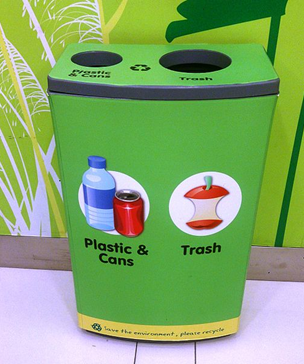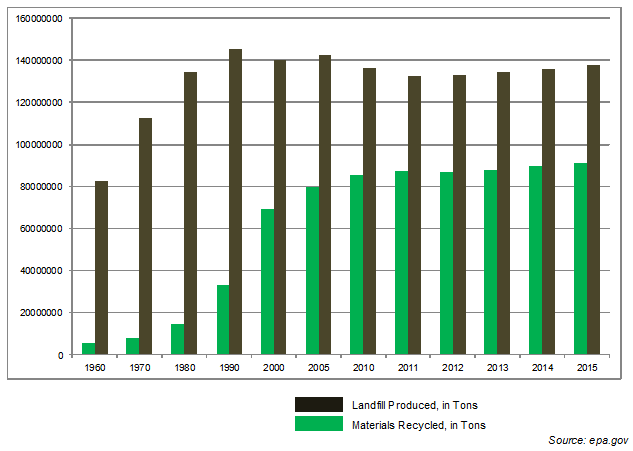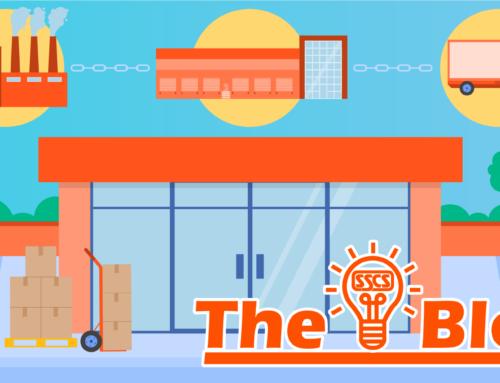
The two industries aren’t necessarily associated with each other, but that may be changing soon.
Many of the more than 114,000 gas stations in the United States, though offering an increasingly broad variety of enticements to attract customers, do not have a place to recycle cans, bottles, and other reusable materials.
Today’s forecourt islands provide passersby with trash bins, water, paper towels, squeegees, and television screens embedded in the pump. But modern consumers accustomed to curbside recycling programs at home and recycling containers at the office may find themselves confronted with a dilemma during their fueling pit stops. Should they just toss their cans, bottles, and food waste into a landfill bin, or should they wait to get home to recycle and compost these materials? It may be important for the convenience store to begin considering this as an enticement as many consumers find recycling important enough that it may be a factor into the businesses that they decide to support. [1]

For the gas station owner, the decision of whether or not to offer recycling is not a simple one. Even if, from a public relations perspective, it is determined that a business selling such an enormous quantity of products with recyclable materials—aluminum cans, plastic bottles, coffee cups sleeves and lids, cardboard packaging and compostable food service waste, just to name a few—would please many by offering easy ways to keep these materials out of the landfill, recycling programs aren’t free. The best operators maintain tight, carefully maintained profit margins, and processing reusable materials means extra work for onsite personnel and other potential new expenses.
Another consideration is that in the past five years, recycling has changed dramatically on a global scale, largely due to Chinese import policies.[2] In 2017, in an effort to cut down pollution, China stopped importing nearly all recyclable materials.[3] Together with falling petroleum prices, which makes plastic recycling less lucrative for everyone, China’s changing policies have disrupted the global recycling trade, leading to cuts in curbside recycling programs or elimination of these programs altogether.
While China’s changing protocol had a broad reaching effect on global recycling, it’s important to note that recycling has been, and will continue to make, an enormous difference in the amount of waste that Americans generate. As the graphic below demonstrates, US recycling after 1990 caused a leveling off of landfill output per year, even as the country’s population continued to rise. The movement, along with grassroots programs centered on composting, and industry efforts to create more environmentally friendly packaging, is making a massive and positive difference in what Americans do with their waste.
 Gas stations, thus far at least, have had little financial incentive to buy into recycling programs. And with China’s recent policy changes, aluminum and plastic recycling doesn’t look like it’s going to grow dramatically more lucrative in the next decade. Nonetheless, forecourt islands remain Ground Zero for reusable plastic and aluminum going into landfill, with busy and road-weary consumers more liable to take the easy route and toss a Gatorade bottle or Red Bull can into the garbage immediately rather than waiting to find a recycling bin later.
Gas stations, thus far at least, have had little financial incentive to buy into recycling programs. And with China’s recent policy changes, aluminum and plastic recycling doesn’t look like it’s going to grow dramatically more lucrative in the next decade. Nonetheless, forecourt islands remain Ground Zero for reusable plastic and aluminum going into landfill, with busy and road-weary consumers more liable to take the easy route and toss a Gatorade bottle or Red Bull can into the garbage immediately rather than waiting to find a recycling bin later.
But things may be changing.
In North America, petroleum retailers have some emerging options to help prevent recyclable materials from going into landfill. Ontario-based CleanRiver Recycling Solutions offers attractive and clearly labeled bins, along with other services to help gas stations and other small business jump start effective and lucrative recycling programs.
Operators looking for a more DIY solution to processing recyclable materials might consider a third party like Recycle Away, which sells a variety of inexpensive trash and recycling stations that can be installed in various types of retail operations. And while the economic side of recycling is evolving, there’s no question that offering recycling bins is very attractive to key U.S. demographic groups.
Another key to making recycling more feasible is having consumers do the work that has often fallen on the shoulders of recycling plants. The above waste unit in Southern Brazil’s Curitiba, shows the extent to which that country’s urban centers have embraced an efficient, color coded means of waste collection. The bins shown, from left to right, collect paper, plastic, metal, compostable material, and glass, and can potentially be collected by different agencies, rather than amassed in a central location.
The bottom line: recycling isn’t going anywhere. While shipping plastic and aluminum overseas requires massive quantities of fossil fuel, which in part defeats the purpose of recycling petroleum-based products like plastic, as America slowly develops its own recycling centers, and as Americans grow more conscientious about sorting and cleaning their own recyclable products (which saves immense amounts of processing time and costs), we may be able to in large part handle our own reusable waste, perhaps someday making “Recycled in America” as cherished a label as “Made in America.” When it happens, SSCS back office technology will be there to help customers track and manage expenses and inventory items related to this goal, helping users maintain profitability in an evolving market, just as we have for the past 40 years.
[1] https://www.wastedive.com/news/what-chinese-import-policies-mean-for-all-50-states/510751/
[2] https://www.reuters.com/article/us-environment-plastics/chinas-plastic-trash-ban-is-spur-to-recycle-u-n-environment-idUSKBN1FI2E2
[3] https://www.businesswire.com/news/home/20160406005465/en/Consumers-Overwhelmingly-Recycling-Important







Leave A Comment